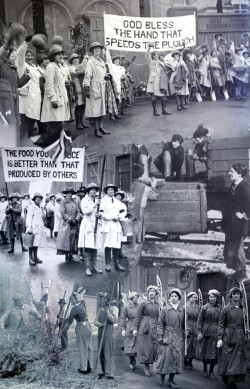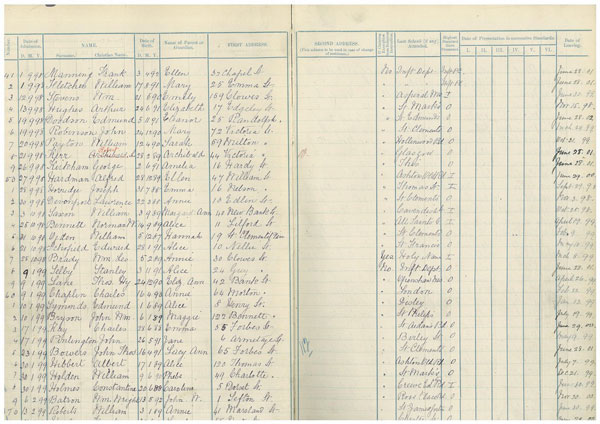Over the last year the other Opening Up Archives trainees and I have blogged on everything from Richard III and ice cream to medieval archives and LGBT history month. We’ve created a Polish Community Project, apps, trained archivists on the digital preservation process, and one of us even ventured outside to an archaeology dig. As our traineeships are coming to an end we’ve picked some highlights and interesting archives for one last blog post.
Julie Thomson – Leicester and Rutland Archives
It’s been a busy, slightly wacky, but overall rewarding year of digital preservation training! The best part is that I was able to throw myself into the day-to-day functioning of my host Record Office in a really hands-on way, and at the end of it all feel like I’d made a significant contribution to preserving its holdings. I also hope my work (both digitising large numbers of items and helping to create an accessible, commercially viable online image library) will ultimately generate some real revenue for the Record Office, as well as promoting local heritage to a global audience. I’ve genuinely enjoyed learning about my colleague Kasia McCabe’s Polish Community Project too. Archives are definitely looking like a viable career path, especially with regard to digital technology.
Personal favourite archive item? That is a tough one. We’ve had Richard III material, Isaac Newton’s property rolls, and a lot of interesting medieval documents. But the photography collections are especially rich, and dealt with exciting material from throughout the 20th century. One of my most abiding interests is the role of women on the home front during the First and Second World Wars. I’ve cheated and made a collage because there are too many good ones!
Kate Sutton – Manchester Archives
I’ve spent a lot of time researching Manchester’s history for various projects, everything from: the creation of the Manchester Guardian and a suffragette attack on Manchester Art Gallery, to the invention of the world’s first stored-program computer, the Small Scale Experimental Machine.
I’ve been constantly reminded that the most intriguing and exciting archives are often found, not as I had originally expected in the illustrious and well-documented collections, but in the inconspicuous and unassuming ones. Below is an admissions register for Armitage Street School, Manchester, which includes the actor and filmmaker Charlie Chaplin – shedding some light on a largely unknown part of his childhood in Manchester and the North West.
Zoe Harrigan and Amy Coaker – Borthwick Institute for Archives
Our traineeship has been at the Borthwick Institute for Archives, based in the University of York, with the main focus being on interpretation skills. We have had training in palaeography, both medieval and early modern, and medieval Latin.
As part of our traineeship at the Borthwick, we curated an exhibition in the public exhibition area. The conservation department were looking for a body of work, comprised entirely of surrogates (copies of original documents), to install into the cabinets when needed. We selected 11 collections which best represented the overall contents of the archives, and conducted lots of research in order to guarantee we would pick the right documents, both visually appealing and/or interesting enough to be used over and over again. The project has been very rewarding as it has meant we have really got to grips with the Borthwick’s holdings and been able to use the skills we’ve been building up over the last year.
Naomi Lewis – West Yorkshire Archive Service (WYAS)
Since starting this traineeship I’ve had the opportunity to meet and work with some great people from my host organisation at the West Yorkshire Archive Service (WYAS), The National Archives, the range of organisations I’ve been in contact with and of course, the other Opening Up Archives trainees. At WYAS, I’ve had the chance to develop new skills, gained a lot of knowledge and gotten experience in a variety of areas within the archives. Also, during the year, I’ve been able to visit some very interesting and impressive places I had not been to before, to see how they deal with their own archives. I have really enjoyed this traineeship and feel fortunate to be part of the Opening Up Archives scheme so I am thankful to WYAS and The National Archives for this opportunity.
Sarah Fellows –Tyne and Wear Archives & Museums and Woodhorn Museum and Northumberland Archives
I’ve thoroughly enjoyed my traineeship, I’ve received digitisation training of a large variety of media formats enabling me to work on some fantastic creative projects within Northumberland and Tyne & Wear Archives. Some of these have included creating content for the ‘Hidden Newcastle’ app, building and designing a Maritime History online exhibition and learning how to write code, making an animation with still images from a shipbuilding collection for Youtube and I’ve worked with musicians who have created music and film influenced by archives collections.
Thank you to everyone who has read and commented on our posts, over the last year, I’m sure the next group of trainees will start blogging soon.

